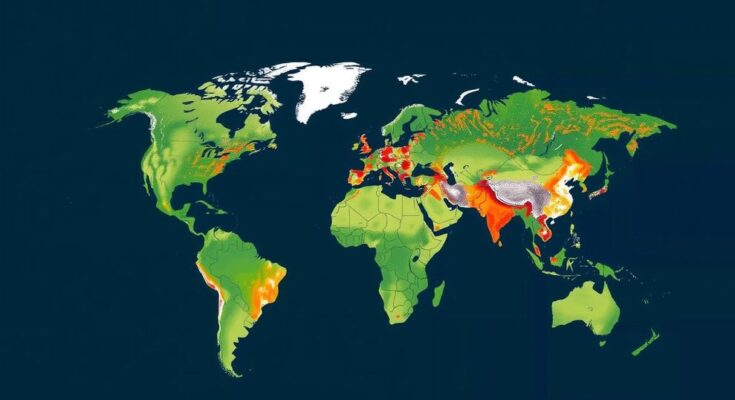COP29, taking place in Baku, Azerbaijan, from November 11 to 22, faces challenges posed by global conflicts, economic tensions, and the return of Donald Trump to power. The conference seeks to solidify North-South financial commitments amid skepticism regarding the potential for effective negotiations. An urgent need for climate funding exists as vulnerable nations stand ready to confront increasing climate impacts, while geopolitical dynamics complicate collaborative efforts.
The 29th United Nations Climate Change Conference (COP29), set to transpire in Baku, Azerbaijan, from November 11 to 22, embarks on its course amidst a tumultuous global backdrop characterized by warfare, economic strife, and political upheaval, notably the return of President Donald Trump. The endeavor to forge a substantive climate agreement is fraught with challenges, as Azerbaijan’s authoritarian governance and heavy reliance on fossil fuels complicate the diplomatic landscape. Following Azerbaijan’s significant military actions in late 2023, calls for boycotts have intensified, highlighting tensions associated with the Nagorno-Karabakh conflict. While last year’s conference in Dubai yielded some progress, Azerbaijan lacks the diplomatic experience necessary to navigate COP negotiations effectively. The recent U.S. elections have further clouded the prospects for fruitful discussions, with the prevailing atmosphere being one of skepticism regarding multilateral cooperation. A central focus of COP29 will be advancing North-South financial commitments, a pivotal aspect of climate negotiations. Developed nations have pledged to provide $100 billion annually to assist developing countries with climate adaptation and mitigation, a target that was delayed. As the need for financial support grows, the Baku conference aims to address the post-2025 financing framework, as vulnerable nations prepare for severe climate impacts that necessitate urgent funding. In light of ongoing global conflicts, one might question the potential for consensus at COP29. Nevertheless, experts suggest that these conferences possess a certain resilience against external pressures, allowing for focused negotiations.Traditionally, negotiation dynamics, characterized by a division between developed and developing countries, may evolve, as geopolitical influences increasingly intrude. The approachability of these discussions is further challenged by domestic crises, which may dampen the willingness of nations to meet funding obligations for climate action. The implications of President Trump’s re-election add another layer of complexity to the negotiations. The dynamics between the U.S. and other major players such as the European Union and China could dictate the success of the talks. Currently, the tensions observed within international relationships complicate collaborative efforts crucial for reaching climate agreements. COP29 arrives at a critical juncture, as the urgency of climate action looms large amid widespread skepticism concerning the effectiveness of such conferences. The United Nations anticipates that existing policies could lead to a substantial increase in greenhouse gas emissions without decisive intervention. With all eyes on Baku, COP29 represents a continuation of the global fight against climate change, albeit overshadowed by various geopolitical challenges.
The backdrop to COP29 is a world embroiled in conflict and economic volatility, primarily exemplified by the ongoing war in Ukraine and tensions within the Middle East. As political leadership shifts with the return of Donald Trump, the landscape for international negotiations is fraught with uncertainty. Azerbaijan’s hosting of the conference is particularly significant due to its authoritarian regime and oil-centric economy, raising questions about the effectiveness of forthcoming climate diplomacy. Furthermore, historical commitments made by developed nations regarding financing for Climate change mitigation are still not fully realized, adding to the complexity of COP29’s objectives.
In summation, COP29 faces considerable challenges given the prevailing global crises and political dynamics. The essential aim remains to establish a coordinated effort towards climate financing, particularly for developing nations. However, the efficacy of negotiations will depend on multiple factors, including geopolitical relationships and domestic pressures. Without strong leadership and collaboration, the path toward a comprehensive climate agreement may prove exceedingly difficult.
Original Source: international.la-croix.com




